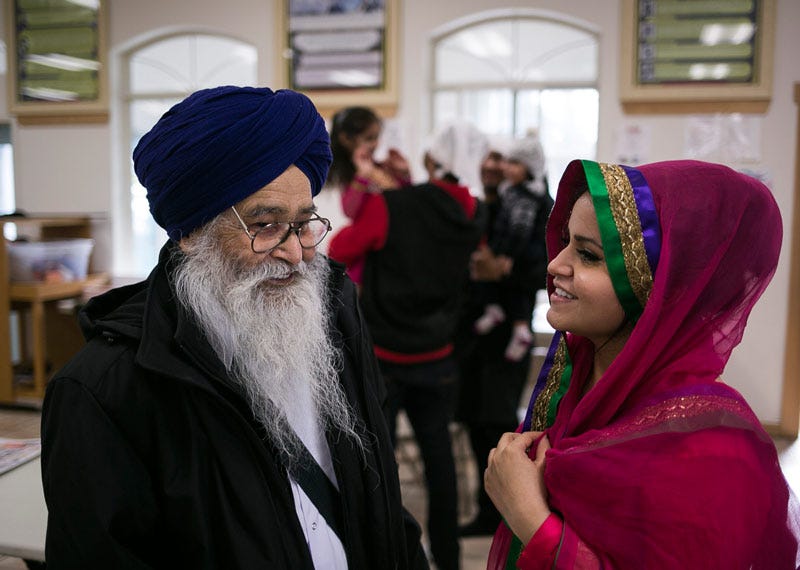Another American Life
Helping Sikhs practice old beliefs in a new country
STORY BY PALOMA PIROTTE | PHOTOS BY NICK DANIELSON
The event was over and all that remained was the maid washing dishes. Her wrinkled hands were pale from cleaning pots and pans with cold hose water because they were too big for the sink. The tattered Punjabi suit and sweater that masked her body didn’t stand a chance in the cold weather. She was trying to restart her life as a Sikh in America at age 70.
“I sat next to [the woman] to help her finish washing the pots and pans,” says Sukhmanii Kahlon, 22, Western student and founder of the organization American Sikhs.
The old woman, like many Sikhs, had come to the U.S. to support her child in his aspirations. Her son, however, wound up in jail and remained there for eight years. She began working as a maid to provide food for herself. [Without healthcare, citizenship or English], it is impossible to live in this country, Kahlon says.
“Her eyeglasses had cracks on them which made it difficult for me to see her eyes. But I didn’t need to see her eyes to be able to see the helplessness in them,” Kahlon says.
Kahlon sat in the silent campus building dressed in professional clothing. Her words were as articulate and sharp as her appearance. She smiled slightly as she explained how her organization began.
Kahlon and the old woman met up again to pick up new glasses as a replacement for the cracked ones. The woman put them on and began to cry.
“She said her tears were not for sorrow for once,” Kahlon says. “That moment was everything for me.”
The Sikh woman Kahlon met that night inspired her to support other Sikh elders restarting their lives in America. From that moment, her organization American Sikhs was born.
“I want them to know and be educated about the land they are living in currently, while still preserving their cultural norms,” Kahlon says.
Kahlon’s sessions began with her approaching elder Sikhs and offering her phone number if they wanted help.

In the past year, American Sikh’s has been approved as a registered organization by Washington State. The classes are branching out from Bellingham to Renton and Bothell, with the potential of going national, Kahlon says.
Her two-hour teaching sessions consist of English language practice and talking about citizenship. Each lesson has a theme such as health or transportation. Currently there are 32 students ranging from ages 60 and older. The American Sikh organization is funded by donations from members of the Sikh temple.
In 2012, immigrants made up 13 percent of the United States population, according to a study by the Migration Policy Institute. A roughly estimated 200,000 Americans are Sikh out of the 25 million Sikhs worldwide, according to the Pew Research Center.
Most Sikh families choose to live in Whatcom County because they have extended family in Vancouver, British Columbia, says Manjit Singh Dhaliwal, a member of the Sikh temple in Lynden. His burnt orange turban wrapped tightly on the top of his head. The long white beard he had grown out framed the smile on his face.
“India has strong family values and ties. [We don’t do] Facetime, we sit in the family room,” Dhaliwal says laughing.
Kahlon considers herself an American, but noticeably lost a piece of herself upon leaving India when she was seven.
“I have been living kind of two lives my whole life,” she says.
For older Sikhs the feeling is worse. They spend their time cooking or watching television because they can’t communicate with the outside world. They have no self-esteem or confidence, Kahlon says.
Kahlon’s student, Jagdish Kaur, 63, helps take care of her grandchildren while her son and daughter-in-law are at work. Her main problem moving from India was finding a job due to her language barrier, she says in Punjabi as Kahlon translates.
Sikhism was founded in Punjab during the sixteenth century by Guru Nanak. He based his doctrine on simplicity of living, monotheism, piety and equality of both men and women who choose to follow Sikhism, according to the Hartford Institute for Religion Research.
Honest work, sharing with others and prayer and meditation are our three guiding principles, Dhaliwal says.
Sikhism is the belief in Seva, which translates to “selfless service,” Kahlon says with pride in her voice. It is tradition that people of Sikh faith perform service to all without thinking of self-benefit.
My family was never rich, Kahlon says. As an example of Seva, Kahlon’s parents would send 20 percent of each paycheck they received to families in India for children’s education, food and other needs.
Kahlon is majoring in communications and minoring in psychology. She is currently studying for the Medical College Admissions Test in hopes of becoming a doctor.
Kahlon’s goal is to end the older generation of Sikhs language isolation and help them restart their lives as American citizens.
The old woman in the punjabi suit had not spoken with another person in a long time. The woman’s tears and the hope she was given from a pair of eyeglasses was unforgettable, Kahlon says.
“She said she never thought the world would be so clear,” she says when reminiscing about the old woman washing dishes that night. “The look in her eyes was priceless.”
